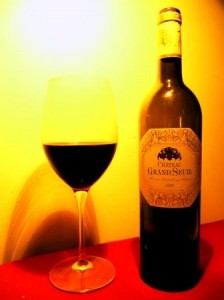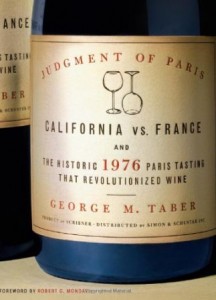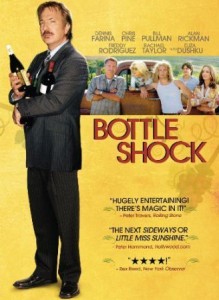The Judgement of Paris @ 35 years – how competition is improving wine
For wine drinkers, The Judgement of Paris – the blind taste-testing that took place 35 years ago today, 24th May 1976 – was a major turning-point in the development of new and better wines the world over.
Organised by a British wine seller and expert, Steven Spurrier, The Judgement of Paris brought together some of the leading French wine experts for a blind wine-tasting of the best and most well-known of French wines, drawn from many famous chateaux, and several New World wines from the relatively (then) recent Californian wineries centred around the Napa Valley.
And, on the 24th May 1976, California won.
The story is quite fascinating and engrossing; the best account I’ve read is George M. Tabor’s extremely readable, lively and engaging account Judgment of Paris: California vs. France and the Historic 1976 Paris Tasting That Revolutionized Wine that recounts the rise of the Californian wineries that culminated in the Californians’ victory. The quite watchable Bottleshock (2008) with Alan Rickman is worth a view and captures the wonderful spirit of the Napa wine insurgents valiantly taking on the prestigious French producers, but is – from my reading of various reports – not nearly as accurate as Tabor’s account. George Tabor was present at The Judgement, as a writer for Time magazine covering the event – and his original report is found here. The scoring of the French judges of the Bordeaux Grands Cru Chateaux reds vs. the Californian Cabernet Sauvignons and the white Burgandies vs. the Californian Pinot Chardonnays can be found at the Wikipedia entry, here, as well as the scoring of follow-up tastings. Tabor’s original report began:
“Americans abroad have been boasting for years about California wines, only to be greeted in most cases by polite disbelief—or worse. Among the few fervent and respected admirers of le vin de Californie in France is a transplanted Englishman, Steven Spurrier, 34, who owns the Cave de la Madeleine wine shop, one of the best in Paris, and the Academic du Vin, a wine school whose six-week courses are attended by the French Restaurant Association’s chefs and sommeliers. Last week in Paris, at a formal wine tasting organized by Spurrier, the unthinkable happened: California defeated all Gaul.”
Five years ago, to celebrate the 30th anniversary of the Judgement of Paris, another wine-tasting was organised by Stephen Spurrier, pitting the Californians once more against the French vintages – and, once again, the Californians triumphed.
Earlier today, George Tabor joined Madeline Brand on Southern Californian Public Radio; listen to him here.
What is interesting – and encouraging for those of us who enjoy wine – is that The Judgement has helped widen the market for wine. New World wines – from California, from South America, Australia, South Africa and New Zealand – have come into their own. Wines that were unheard of 35 years ago now command attention; in part because The Judgement confirmed publicly (and with much attendant publicity) what was already underway: the emergence of new, good wines capable of challenging the hegemony of French wines at at every grade of quality and price – to the benefit of new producers the world over and, most especially, to us wine drinkers! As George Tabor writes (p. 230):
“The Paris Tasting shattered two foundations of conventional wisdom in the world of wine. First, it demonstrated that outstanding wine can be made in many places beyond the hallowed terroir, but maybe there are other places that are equally amenable to growing grapes that can make equally outstanding wine. If the soils of the Napa Valley could produce wines that bested the best of Burgundy and Bordeaux, what can be done in Australia, South Africa, or Chile?
“Second, the Paris Testing showed that winemakers did not need a long heritage of passing the wisdom of the ages down from one generation to the next to master the techniques for producing great wine. Newcomers could cut the discovery time dramatically if they did good research and followed French and now California procedures. Only twenty-three years transpired between the breakthrough developments at James Zellerbach’s Hanzell, the first California winery that set out to make quality wines in the French style, and the Paris Tasting. But Chile in just the decade of the 1990s totally remade its antiquated wine business and brought it up to global standards.”
Interestingly, the one country that seems to have responded least-well to the Paris Tasting in 1976 is, somewhat surprisingly, France. As Mike Steinberger wrote in “The Judgement of Paris: What the French didn’t learn from the legendary wine-tasting” on the 30th anniversary:
“France losing to the United States at wine? Unthinkable. In a century filled with indignities for France, the Judgment of Paris was another cruel blow. For the most part, though, the French refused to take the result seriously, dismissing it as either an aberration or, worse, the product of Anglo-American chicanery (the tasting was organized by a Brit, Steven Spurrier, who was accused of serving French wines that were either too young or from inferior vintages). The central lesson of the tasting—that competition was now at hand and that French wines would no longer necessarily enjoy a presumption of superiority—was lost on the French. Thirty years later, some of them are paying dearly for their complacency.”

As Steinberger noted:
“Domestic consumption has dropped by more than 40 percent over the last four decades. And France has been hemorrhaging market share abroad, particularly in the two fastest-growing markets, the United States and Britain. The French share of the American market for imported wines fell from 26 percent in 1994 to 14 percent in 2004. Inept marketing is one big reason for the decline, and this ineptitude can be put down to complacency and chauvinism.
“The French have been blindsided by the emergence of aggressive competition from Italy, Spain, Australia, South America, and other regions. This isn’t true of the very finest French producers; thanks in part to the Judgment of Paris, they recognized early on that the New World was capable of making excellent wine, and they worked to improve their own offerings (which they have done—the good French wines have never been better). By and large, though, after 1976, the French continued to assume that their wines were the only ones worth drinking. They had little interest in foreign wines (even now, French wine shops offer astonishingly few imports), and they put little effort into salesmanship because they figured that French wines, simply by virtue of being French, would sell themselves.”
And, unfortunately for French wine producers, that is simply not the case any longer.
Just as in other markets, competition and entrepreneurship is stimulating the search for new products, new and better ways of satisfying consumer demand. For those who love fine wines or who want a palatable, low-cost wine with their dinner, the growth in vinyards the world over has been a boon, bringing new tastes, new pleasures to wine drinkers.

